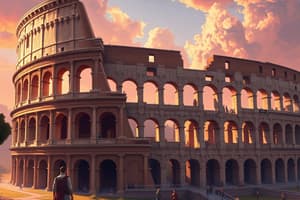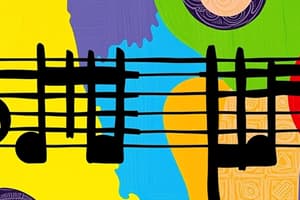Podcast
Questions and Answers
ما هو الشرك الأكبر؟
ما هو الشرك الأكبر؟
الشرك الأكبر هو إشراك غير الله في عبادته, أو إلهيته, أو أسمائه, أو صفاته.
ما هي أنواع الشرك الأكبر؟
ما هي أنواع الشرك الأكبر؟
أنواعه هي: الشرك بالعبادة, و الشرك بالربوبية, و الشرك بالأسماء والصفات.
هل يُمكن لله أن يغفر للشرك الأكبر؟
هل يُمكن لله أن يغفر للشرك الأكبر؟
False (B)
ما هو الغرض من خلق الله للجن والإنس؟
ما هو الغرض من خلق الله للجن والإنس؟
هل يُمكن للشرك أن يُبطل الحسنات؟
هل يُمكن للشرك أن يُبطل الحسنات؟
ما هو مصير المشركين؟
ما هو مصير المشركين؟
ما هو الدليل على خطورة الشرك؟
ما هو الدليل على خطورة الشرك؟
ما هو دور النبي محمد صلى الله عليه وسلم في محاربة الشرك؟
ما هو دور النبي محمد صلى الله عليه وسلم في محاربة الشرك؟
ما هو حال الشرك في عصرنا الحالي؟
ما هو حال الشرك في عصرنا الحالي؟
من هو فرعون؟
من هو فرعون؟
كيف ظلم فرعون بني إسرائيل؟
كيف ظلم فرعون بني إسرائيل؟
ما هو دور موسى عليه السلام في نصر بني إسرائيل؟
ما هو دور موسى عليه السلام في نصر بني إسرائيل؟
من هم الصحابة؟
من هم الصحابة؟
ما هو فضل الصحابة؟
ما هو فضل الصحابة؟
ما هو أهم دور للصحابة في حياة المسلمين بعد وفاة النبي محمد صلى الله عليه وسلم؟
ما هو أهم دور للصحابة في حياة المسلمين بعد وفاة النبي محمد صلى الله عليه وسلم؟
ما هو أهمية الحديث الذي رواه أبو سعيد الخدري؟
ما هو أهمية الحديث الذي رواه أبو سعيد الخدري؟
Flashcards
الشرك الأكبر
الشرك الأكبر
الإشراك بـ الله في ربوبيته أو ألوهيته أو أسمائه وصفاته
لماذا الشرك الأكبر خطيئة؟
لماذا الشرك الأكبر خطيئة؟
مقابلة الخالق بخلقه، واعتبارهم متساوين في القوة والسلطة
الشرك الظاهر
الشرك الظاهر
العمل الظاهر، مثل عبادة الأصنام أو القبور أو الموتى
الشرك الخفي
الشرك الخفي
Signup and view all the flashcards
الشرك في العقيدة
الشرك في العقيدة
Signup and view all the flashcards
الشرك في القول
الشرك في القول
Signup and view all the flashcards
الشرك في العمل
الشرك في العمل
Signup and view all the flashcards
عدم غفران الشرك الأكبر
عدم غفران الشرك الأكبر
Signup and view all the flashcards
غاية الخلق
غاية الخلق
Signup and view all the flashcards
بطلان العمل الصالح بسبب الشرك
بطلان العمل الصالح بسبب الشرك
Signup and view all the flashcards
عقوبة الشرك
عقوبة الشرك
Signup and view all the flashcards
Study Notes
Major Polytheism
- Major polytheism is associating a partner with Allah in his lordship, divinity, or names & attributes.
- It's considered the greatest sin as it compares the perfect creator (Allah) with imperfect creations.
- Two types of major polytheism:
- Apparent: Visible acts of worship to idols, graves, or deceased individuals.
- Hidden: Individuals claiming Islam outwardly but inwardly worshipping other gods or disbelieving.
- Divisions of major polytheism include:
- Belief: Believing someone besides Allah controls creation, the unseen, or forgives sins.
- Speech: Calling on others for help or mocking Allah's attributes.
- Deeds: Performing acts of worship for someone other than Allah.
- Polytheism is the greatest sin because:
- There's no forgiveness (unless repented).
- It contradicts the purpose of creation (Jinn and humans were created for worship).
- It nullifies good deeds.
- It leads to hellfire.
Pre-Islamic Polytheism
- Before the Prophet, many practiced polytheism, worshipping idols, some distorted forms of Christianity and Judaism, fire, planets, or had no religion.
Prophet's Role in Eliminating Polytheism
- The Prophet guided people from darkness to light by destroying idols, prohibiting polytheism, and stopping ways leading to it, encouraging worship of the one true God (Allah).
Polytheism Today
- Polytheism still exists today—people can worship idols, animals, individuals, visit soothsayers, fortune tellers or magicians.
Musa (Moses) (PBUH):
- One of the most admired messengers
- Spoke with Allah directly
- Endowed with wisdom, knowledge, and the Torah
- Among his greatest miracles: splitting the sea with his staff, and his hand becoming white and shining without any flaw when he took it out of his shirt.
- Allah communicated directly with Musa. (Surah An-Nisa 164)
- Musa's mother saved him from being killed by placing him in a box in the river.
- The Torah was revealed to Musa as guidance for the Israelites.
- Musa's story emphasizes patience, obedience to Allah, reliance on Him, and staying true to our faith.
- In Egypt, Pharaoh oppressed the Israelites by killing male infants while keeping females alive; Egyptians worshipped Pharaoh instead of Allah.
- Musa's wife (Asiya) was able to nurse a child and Musa is able to return to his mother during his adoption period.
Companions of the Prophet
- The Prophet's companions were chosen by Allah.
- They were the best of creation after the Prophet.
- They had pure hearts and profound knowledge.
- Allah and the Prophets praised their virtues in the Quran and Hadith (narrations).
- They played a crucial role in preserving the Quran by memorization and writing; they also learned and applied the Quranic teachings.
- They recorded and taught the Prophet's life and actions (Sunnah).
- They conveyed knowledge to future generations.
- Insulting the companions is forbidden per Hadith.
Studying That Suits You
Use AI to generate personalized quizzes and flashcards to suit your learning preferences.




